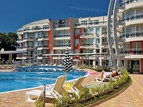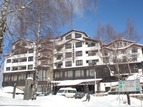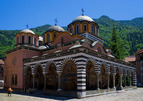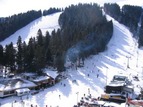TOURISM BAROMETER: Owning Orpheus
Sofia Echo Com, 21.03.2005
THE public dispute between Bulgaria and Greece over the origin of the mythological hero Orpheus and about which of the two countries could use the figure in its tourist advertising, appears to have been solved after steps taken by the Bulgarian side. First, the scientific community made a move to calm the row. Popular Bulgarian archaeologist Professor Nikolai Ovcharov, at a news conference on March 9, urged the Cabinet to come up with an opinion on a new advertising campaign by the Greek ministry of tourism and its motto “Come to the Land of the Mythical Orpheus”. Ovcharov said the campaign could lead to confusion about the idea that Bulgarians are taught at school that Orpheus was a Thracian singer. He quoted the entry on Orpheus in the Bulgarian Encyclopaedia, which says that he was an ancient Thracian mythical singer, musician and poet. The interpretation of ancient sources proves in a categorical way that Orpheus is a figure from Thracian history and culture, Ovcharov said, adding that in Greek culture, Orpheus’s image is associated with legends and other Ancient Greek myths. The archaeologist said that unlike the Greeks, the Thracians had no letters. That is why Orpheus is a central figure in Greek mythology. A Thracian by birth, Orpheus should be considered an all-Balkan hero, according to Ovcharov, who added that the Balkan nations should be certain of Orpheus’s Thracian origin and honour him without claiming that he belongs to any one particular nation. In the early Christian era, Orpheus was described as a humble shepherd and a man of God, Ovcharov said. He survived in folk tradition, too, as a mountain shepherd, singer and poet, and as a hero as well. It is no coincidence that Orpheus is most lastingly portrayed in the folklore of the Rhodope Mountains. Excavations in the Eastern Rhodope Mountains showed that Orpheus and his followers shaped the Thracians’ beliefs in the Rhodope Mountains, Ovcharov said. Ancient Greek sources prove that Orpheus had a role to play in the shaping of Greece’s largest sanctuaries, Eleusis and Delphi. Then the newly appointed Minister of Culture and Tourism, Nina Chilova, got into the act. Leading Bulgaria’s delegation to the ITB tourism exhibition in Berlin on March 11, she met her Greek counterpart, Dimitris Avramopoulos. They agreed that Bulgaria and Greece would pursue a joint policy to turn the region into one of Europe’s new attractive tourist destinations. Chilova has suggested that one of the first joint projects should be a product entitled “The Rhodope Mountains: Orpheus’s Birthplace”. Meanwhile, Bulgarian tourist agents expect the annual flow of German tourists to Bulgaria to increase by up to five per cent this year, Deputy Economy Minister Dimitar Hadjinikolov told journalists on March 11. Hadjinikolov was also a member of Bulgaria’s delegation at the event. According to the annual Reiseanalyse consumer survey, conducted in January and presented at the forum in Berlin, major destinations for the German tourists include Turkey, Tunisia and Majorca, which are in strong demand for the summer, but Bulgaria, the Canary Islands and Italy are down on last year. Speaking at the opening ITB news conference, Klaus Laepple, president of the German travel agents and tour operators association DRV, said winter sales revenues for tour operators had increased 3.5 per cent. He predicted an increase of up to six per cent this summer. Turkey, Morocco, Tunisia and Portugal are in strong demand along with Spain, particularly Majorca, Laepple said, but bookings for Egypt and Bulgaria have all moved downwards. Hadjinikolov did not find these figures worrying, and said the actual number of holiday bookings from Germany for Bulgaria was yet to become known. He said that Bulgaria was implementing a new policy to encourage Germans to continue visiting Bulgaria in large numbers, as in 2004. In Laepple’s view, construction works at Bulgarian Black Sea resorts were creating inconvenience, which would cause a decline in German bookings. Chilova’s response was that the mayors of Nessebur and Varna had assured her that construction work at these resorts would end by April and disruptions would be avoided during the high tourist season. “Our ministry will demand strong guarantees from all municipal administrations in the coastal areas that the summer holiday season will begin successfully and in normal conditions,” Chilova said. Meetings will be held “on the spot” in early April to review the state of play of construction projects. ITB Berlin projects a modern image of Bulgaria as the country is advertised as a year-round tourist destination offering a full range of holiday services, said Tourism Agency director Bisser Yalumov. Besides printed materials, the Bulgarian section of the exhibition offered showings of two 30-minute videos: one featuring the capital Sofia and the other advertising Bulgaria’s summer and winter holiday attractions. More than seven million foreigners have visited Bulgaria in 2004, up 11.9 per cent year on year, the National Statistical Institute said on March 10. Visitors from Ireland increased the most, by 81.6 per cent, followed by the UK and Portugal, with 60.5 per cent and 60 per cent growth, respectively. A total of 4.01 million foreigners visited Bulgaria as tourists in 2004, up 13.6 per cent compared to 2003. The number of tourists from Greece, 707 000, was the highest, followed by Macedonians (656 000) Serbia-Montenegrins (577 000) Germans (565 000), Brits (259 000) and Russians (121 000). Meanwhile, in 2004 Bulgarians made 3.8 million trips abroad, 14.1 per cent up from the figure for the previous year. Business trips accounted for the greatest number of trips in 2004 – 2.2 million – or 56 per cent. Tourist visits totalled 1.1 million or 27.7 per cent. see source
 Member of:
Member of:



























 Touroperator
Touroperator
